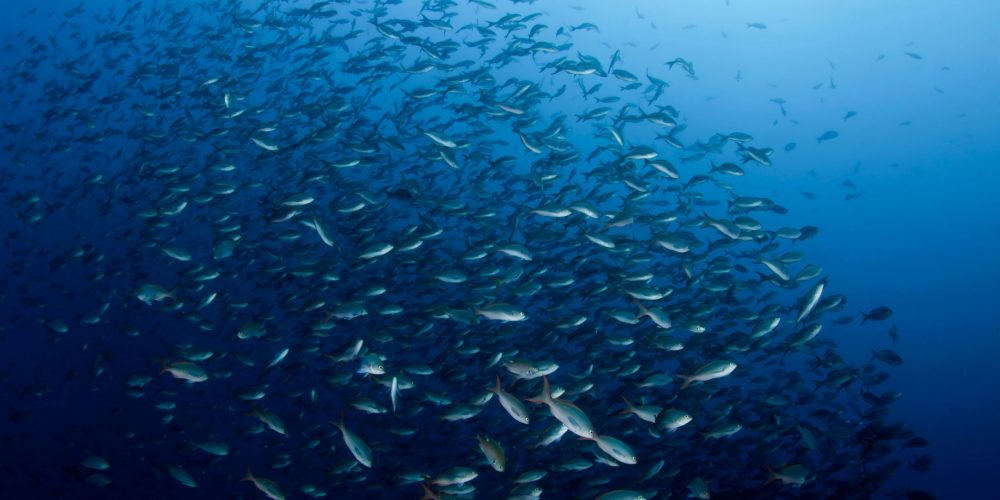By Monica Allard-Cox
Contributions by Allie Shinskey
Fish are more valuable than diamonds, according to economist Rashid Sumaila.
He made this case to a skeptical audience at a conference in Namibia. ̀Diamonds, he told the conference attendees, are not a renewable resource. Contrary to the popular slogan, Sumaila said, a diamond “is not forever … you dig it up, it’s gone.”
“‘How many of you have seen diamonds in your life? How many have worked for a diamond company?’” he asked the group.
Very few.
“‘How many of you have eaten fish this evening?’ Oh my gosh, the room!”
“Fish is more valuable than diamonds,” he concluded. “It is valuable to a wide range of people, millions of people. Diamonds [are valuable to] an elitist group, 1%.”
If well managed, he said, fish “will continue to nourish us through time, feed us, employ us, give us jobs through time to infinity. And anything that gives you a benefit, even if it’s small, if it goes to infinity … the benefit is infinity. Violà. That’s infinity fish, right?”
That concept, infinity fish, became the title of Sumalia’s new book, Infinity Fish: Economics and the Future of Fish and Fisheries, and the basis of his recent lecture at the University of Rhode Island Honors Colloquium, “Sustaining Our Shores.”

Sumaila, a professor at the University of British Columbia and the university’s research chair in Interdisciplinary Ocean and Fisheries Economics, talked about his belief that “the ocean is for all of us, all generations, those before and those coming.”
He described humanity’s approach to the oceans as “very basic. We do two things with our ocean … we take all the good stuff, the things we like, the things we want, the things we need, the things we desire, we take them out of the ocean—the fish, oil, the gas, whatever. We take them out of the ocean into our economy … and what do we produce? We produce waste, and where does the waste go? [It goes] back to the ocean and to the environment … And we need to recognize this very deeply, we are intertwined. And if we do the taking too much, or we do the pollution too much, we are going to kill this system. And we won’t get infinity fish.”
Part of the reason for the mismanagement that leads to these destructive behaviors, Sumaila said, is that we undervalue ocean resources such as fish by only considering their market price.
Dr. Ussif Rashid Sumaila is Professor and Director of the Fisheries Economics Research Unit at UBC Fisheries Centre.
By placing a dollar value on things associated with that resource—like cultural and social values, employment, health, and the environment—communities and their governments can be more motivated to make choices that preserve those resources.
To change this, Sumaila proposed the idea of developing a more holistic valuation—taking into consideration the value of fish as food and a source of jobs—as a way for communities to demand better resources management from their leaders. By demonstrating the importance of a resource by placing a dollar value on things associated with that resource—like cultural and social values, employment, health, and the environment—communities and their governments, he argued, can be more motivated to make choices that preserve those resources.
As an example, Sumaila said, a project with the First Nations Fisheries Council in British Columbia to estimate the total economic value for the sockeye salmon fishery took those less-tangible qualities into consideration, providing project participants with a hypothetical $100 to spend on them. Based on their choices, the “whole value” of the fish was determined to be $35.63/lb, compared with a market price of $3.75/lb.

$ Whole Value of Sockeye Salmon
$ Market Value of Sockeye Salmon
And these fisheries resources are not only valuable to local communities, but to nations—Sumaila said that the number of people employed in fisheries worldwide is significant enough that if those jobs were to go away, the economic migration that would result would impact countries around the world.
Besides thinking about the whole value of fish in the present, Sumaila said, it’s important to consider future benefits of sustaining the fishery resource. It’s human nature, he said, “to put more value on things that benefit you now than things that will come in the future.”
He pointed to the infamous depletion of the cod fishery in Canada as an example of the problem with this approach to management—or non-management—of ocean resources.
Such short-term thinking, he said, was in part driven by political considerations. For instance, he said, he recommended to the Canadian Parliament to end fisheries subsidies that in his estimation encourage overfishing, and a member of Parliament from Prince Edward Island asked him, “Are you telling me to go to my constituency and tell them I’m taking their subsidies? Are you crazy?”
To try to encourage more long-term approaches, Sumaila said, his group not only publishes their work in peer-reviewed journals, they also communicate it to the public and to politicians. And when he’s gotten calls from people surprised to find, for instance, that their taxes are supporting subsidies, he encourages them to write to their political leaders—applying a kind of pressure that, he said, has led to changes in some countries.
Further, he said, what gives him hope are the efforts of young activists. He mentioned an African youth group whose motto is, “Our Africa, our ocean, our future.”
Sumaila said he spoke with members of the group recently, and they told him that “they are going to organize a demonstration in all the capitals of the 54 countries … They’re going to talk about the fish, the ocean, why the continent has to manage it well. So pressure from the population is what gives me a bit of hope.”
Global Subsidies Disadvantage to Women
Annual global subsidies to commercial fisheries, Sumaila said, total $22 billion, with 80% of that going to industrial fishing boats and only 20% to small-scale fisheries. This leads to another inequality, he said, as there are more women, proportionately, that fish in small scale fisheries compared to large-scale fisheries.
“By giving 80% of our tax money to the big scale [fisheries], we are disadvantaging women right now around the world, which I think is the last thing any sane society should do.”
Sustaining Our Shores
The University of Rhode Island Fall 2021 Honors Colloquium, Sustaining Our Shores, is coordinated by J.P. Walsh, director of the URI Coastal Resources Center, and Andrew Davies, URI associate professor of biological sciences. Rhode Island Sea Grant Extension staff have participated in the planning of this colloquium.

